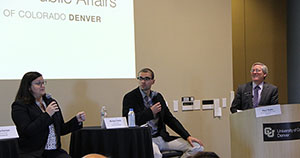CU Denver School of Public Affairs convenes discussion with expert panel on 2019 Colorado election results
Emma Martz | School of Public Affairs Nov 14, 2019
The panelists were Michael Fields, Executive Director of Colorado Rising Action (representing a right-of-center view); Lynea Hanson, Senior Vice President of Strategies 360 (representing a left-of-center view); and Eric Sondermann, Freelance Pundit and Opinion Columnist for ColoradoPolitics.com (representing a center view). The panel was moderated by Paul Teske, Dean of the University of Colorado School of Public Affairs.
Topics of focus for the discussion included noted themes from the elections, voter turnout, analyses of Propositions CC and DD, and what the public might expect from future elections.
Sondermann offered his thoughts on the common election themes, stating that Republicans continue to struggle in the suburbs and that he was surprised by the voter margins for the different propositions. Hanson commented that there were financial victories across the local level and that we continue to see that people, “like to see their money stay closer to home,” in reference to the TABOR tax. Fields cautioned that off-year elections don’t necessarily reflect the national voter climate.
The panelists then discussed the controversial results of Proposition DD and Proposition CC. Proposition DD, a measure to authorize and tax sports betting to fund water projects, won by a slight 0.5% margin, whereas Proposition CC, a measure to retain TABOR refunds for education and transportation funding, lost by a 5% margin. The panelists credited the passing of Proposition DD to bipartisan coalitions as well as the carrot of improving water projects. For Proposition CC, each panelist offered their analysis of why it failed and what happens next.
The consensus among panelists was that the failure was due to the timing of Colorado’s elections during this election year, confusion concerning the language of what the measure entailed, and an agreement that the majority of voters wants to reclaim any tax overpayments rather than permit the government to retain the surplus. According to Hanson, this won’t be the last time we will see this issue of eliminating the revenue cap, or “de-Brucing” as it is commonly known in Colorado, come up during elections.
The panel then offered some closing insight into the 2020 primary election. With the Presidential race and the race for the Senate between Corey Gardner and John Hickenlooper, panelists predict an exciting year to come. Putting it plainly, Sondermann said that, “anyone who expects 2020 to be a straight line is in for a rude awakening,” touching on the unpredictability of elections based on the outcomes of the previous years.
Follow the School of Public Affairs on SoundCloud and listen to the audio recording of the November 8 First Friday Breakfast. This month’s event catering was provided by Alma Catering.
Categories:
Colorado & Communities
Public Management & Finance
Public Policy & Society
School of Public Affairs
|
Tags:
First Friday Breakfast
Paul Teske
School of Public Affairs